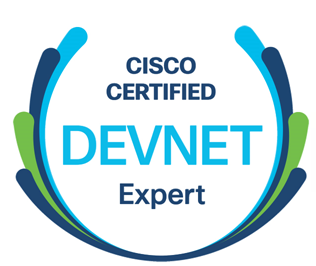
DevNet Expert Certification
Showcase your ability to develop and maintain applications built on Cisco platforms. Build a unique blend of software and infrastructure skills, perfect for NetDevOps roles, with the Cisco DevNet Expert certification.

Showcase your ability to develop and maintain applications built on Cisco platforms. Build a unique blend of software and infrastructure skills, perfect for NetDevOps roles, with the Cisco DevNet Expert certification.
Showcase your ability to develop and maintain applications built on Cisco platforms. Build a unique blend of software and infrastructure skills, perfect for NetDevOps roles, with the Cisco DevNet Expert certification.
Develop for what's next
With the DevNet Expert certification, you'll gain an advanced blend of skills—from app development on Cisco platforms to software and infrastructure know-how—that are ideal for NetDevOps roles.

Cisco DevNet Expert Certification
Software Design
Show your ability to gauge whether apps are resilient, scalable, and maintainable, and use logs to diagnose issues.
Using APIs
Demonstrate that you can optimize API usage and employ REST APIs for functions like error handling and pagination.
Deployment Automation
Be able to build automation workflows and use technical specs to develop configuration management solutions.
Data security
Demonstrate your expertise in privacy, Secure Sockets Layer (SSL) certificates, Open Worldwide Application Security Project (OSWAP) threats, and end-to-end encryption principles.
How it works
No formal prerequisites necessary
Most learners have three to five years of experience in designing and implementing applications built on Cisco platforms, including Python programming.
Common learner profiles
DEVCOR – Cisco Certified DevNet Expert
Senior Network Engineer : Design, build, and automate physical and wireless networks. Senior Automation Engineer : Use software to automate the provisioning, configuration, and deployment of network infrastructures. Senior Infrastructure Architect : Plan, implement, oversee, and support the systems that run tech infrastructure.
| Fees Structure : | 15500 INR / 185 USD |
| Total No of Class : | 96 Video Class |
| Class Duration : | 48:30 Working Hours |
| Download Feature : | Download Avalable |
| Technical Support : | Call / Whatsapp : +91 8680961847 |
| Working Hours : | Monday to Firday 9 AM to 6 PM |
| Payment Mode : | Credit Card / Debit Card / NetBanking / Wallet (Gpay/Phonepay/Paytm/WhatsApp Pay) |
| Fees Structure : | 22500 INR / 270 USD |
| Class Duration : | 60 Days |
| Class Recording : | Live Class Recording available |
| Class Time : | Monday to Firday 1.5 hours per day / Weekend 3 Hours per day |
| Technical Support : | Call / Whatsapp : +91 8680961847 |
| Working Hours : | Monday to Firday 9 AM to 6 PM |
| Payment Mode : | Credit Card / Debit Card / NetBanking / Wallet (Gpay/Phonepay/Paytm/WhatsApp Pay) |